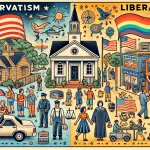I was raised in a family where we “didn’t see race.” This was the world of “colorblind” conservatism. I believed we lived in a post-racial world where everyone was equal and it was the quality of your character that mattered, not the color of your skin. And then I grew up, and I realized that the era of racial equality I thought I had been living in was a fairytale—a myth.
We are at this moment in the wake of George Zimmerman’s acquittal in the murder of Trayvon Martin. A friend of mine recently told me about how an African American law professor of hers once told her about giving his son the “how not to get killed” speech. She told me that he told his son that he might have constitutional rights, but those rights didn’t matter jack shit if he was dead. My son is white, and because of that my son being a victim of potentially deadly racial profiling is something I don’t have to worry about—something I have never had to think about. I have privilege.
This week Lisa Wade of Sociological Images has been doing some amazing blogging on race, the criminal justice system, and America. Let me offer some links and some excerpts, because I think you will find it interesting as well.
In 2002, a study by Joshua Correll and colleagues, called The Police Officer’s Dilemma, was published. In the study, researchers reported that they presented photos of black and white men holding either a gun or a non-threatening object (like a wallet) in a video game style setting. Participants were asked to make a rapid decision to “shoot” or “don’t shoot” each of the men based on whether the target was armed.
They found that people hesitated longer to shoot an armed white target (and they were more likely to accidentally not shoot). Participants were quicker and more accurate with black armed targets but there were more “false alarms” (shooting them when they were unarmed). These effects were present even though participants did not hold any explicit discriminatory views and wanted to treat all targets fairly.
The effect we see here is a subconscious but measurable preference to give white men the benefit of the doubt in these ambiguous situations. Decision times can vary by a fraction of a second, but that fraction can mean life or death for the person on the other end of the gun.
Stand Your Ground Increases Racial Bias in “Justifiable Homicide” Trials:
At MetroTrends, John Roman and Mitchell Downey report their analysis of 4,650 FBI records of homicides in which a person killed a stranger with a handgun. They conclude that stand your ground “tilts the odds in favor of the shooter.” In SYG states, 13.6% of homicides were ruled justifiable; in non-SYG states, only 7.2% were deemed such. This is strong evidence that rulings of justifiable homicide are more likely under stand your ground.
But which homicides?
Ones similar to the one decided in favor of George Zimmerman today. A finding of “justifiable homicide” is much more common in the case of a white-on-black killing than any other kind including a white and a black person. At PBS’s request, Roman compared the likelihood of a favorable finding for the defendant in SYG and non SYG cases, consider the races of the people involved. The data is clear, compared to white-on-white crimes, stand your ground increases the likelihood of a not-guilty finding, but only when a person is accused of killing a black person.
Notice, however, that white people who kill black people are far more likely to be found not-guilty even in states without SYG and black people who kill whites are less likely to be found not-guilty regardless of state law.
It’s simple: We are already biased in favor of the white defendant and against the black victim. Stand your ground laws give jurors more leeway to give defendants the benefit of the doubt. This increase even further the chances that a white-on-black homicide will be considered justifiable because jurors will likely give that benefit of the doubt to certain kinds of defendants and not others. Stand your ground may or may not be a good law in theory but, in practice, it increases racial bias in legal outcomes.
These next two aren’t directly applicable to the George Zimmerman case, but they are still relevant more generally to the issue of race in our criminal justice system. Post racial nation? Think again.
The Death Penalty, Race, and the Victim:
There is much to be worried about when one considers the role racial discrimination plays in delivering the death penalty. Scholars are newly looking to the way that the race of homicide victims, instead of the defendants, shape outcomes. It turns out a disproportionate number of people who are executed under the death penalty have been convicted of murdering a white person (Amnesty International):
“[H]olding all other factors constant,” Amnesty International summarizes, “the single most reliable predictor of whether someone will be sentenced to death is the race of the victim.”
Racial Bias in Presidential Pardons:
In analysis of Presidential pardons during the George W. Bush administration, ProPublica has found that whites were four times as likely as non-whites to be granted a pardon. Pardons were granted to 12% of whites, 10% of Hispanics and Asians, and zero percent of Blacks and Native Americans. The disparity remained even when investigators controlled for type of crime.



















